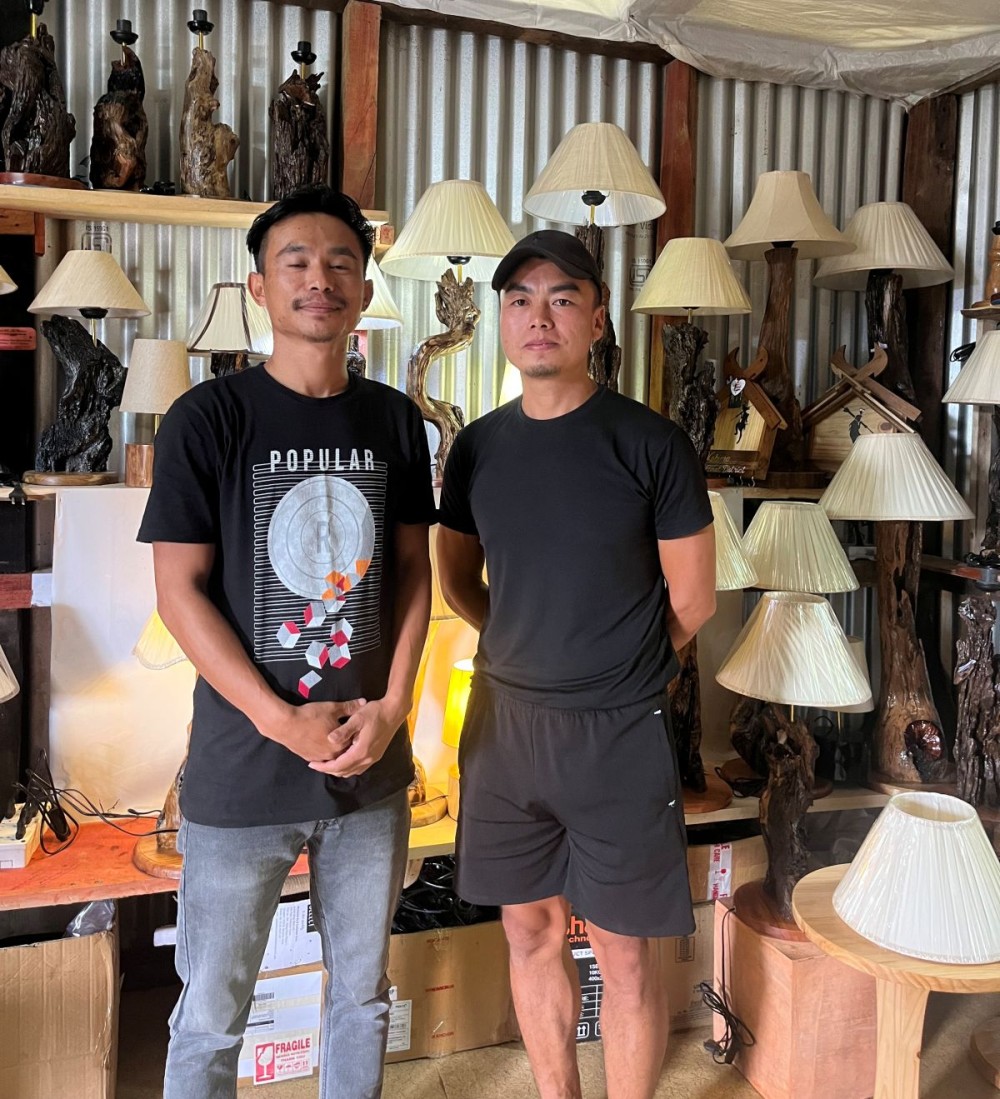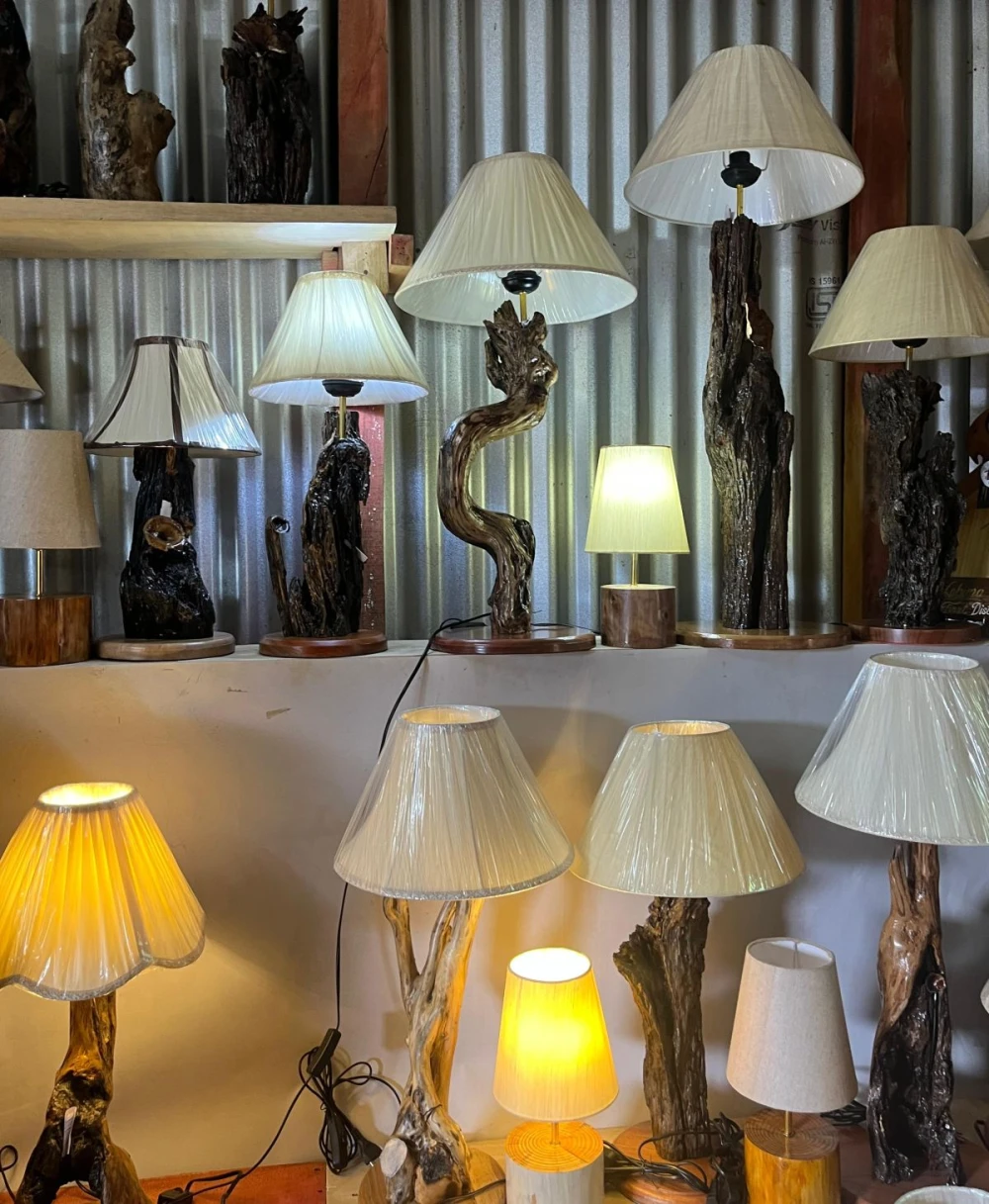Tsenthungo Lotha and Ejungthung Ngullie at their ‘Woodpecker’s Willow’ workshop in Tchuyiro Colony, Wokha town.

Meribeni T Kikon
Wokha | September 25
In a small workshop in Tchuyiro Colony, Wokha town, two friends are crafting something exceptional in Nagaland - wooden table lamps. Crafted from fallen trees, these lamps carry the name ‘Woodpecker’s Willow’ and are handcrafted by two childhood friends Tsenthungo Lotha of Akuk Village and Ejungthung Ngullie of Longla Village in Wokha District. Their long-standing bond and shared curiosity sparked their unique venture into making wooden table lamps.
From Curiosity to Craft
Their journey began in October 2023, fueled purely by curiosity and a fascination with wood and light. They had no training, no roadmap but only an idea that something beautiful could be created from nature. The spark came unexpectedly when Tsenthungo’s father found a small piece of wood, its shape naturally striking.
Tsenthungo, inspired by its form, thought he could create something from it. Together, the friends carefully cut the elder wood and, almost experimentally, fitted it with bamboo shades. When they lit it, the soft glow that spilled out amazed them. “It looked so beautiful,” they recalled.

“That first lamp was just curiosity, but it gave us the idea to explore the combination of wood and light. From that moment, we began crafting table lamps, using whatever we could find and imagining new designs inspired by the shape of the wood itself.”
That single, serendipitous piece of elder wood became the seed of their venture, transforming a playful experiment into a rare craft in Nagaland.
Back then, we had only heard about lamps and seen them on television, but had never actually used one at home or seen one in real life, they added.
Trading Jobs for a Dream
Before lamp-making, life looked very different, both were in very different professions. Tsenthungo Lotha worked in the banking sector, while Ejungthung Ngullie was a teacher. Although their jobs provided stability and a steady income, Tsenthungo felt something was missing. “Even though I was earning well, I wasn’t completely satisfied,” he said. “I wanted to do something more hands-on, something that felt like mine.”
It was this shared curiosity and the desire to do something meaningful that led them to leave their jobs and step into the unknown world of wooden lamp-making—a craft that is still rarely seen in Nagaland.
.webp)
Crafting Lamps from Naga Cut Wood
At the heart of Woodpecker’s Willow is a simple philosophy—never cut trees. All the wood they use is collected from forests across the district, but only from naturally fallen trees or leftover pieces. “It’s like reviving a dead tree and giving it light,” they added.
Tsenthungo Lotha and Ejungthung Ngullie create a variety of wooden table lamps using locally sourced Naga cut wood collected from different areas. The duo shared that they started their business at home with small machinery and their personal savings. “At that time, we were not fully operational,” they said. As their business grew, they realized the need for larger machines, so they applied for a PMEGP loan to invest in bigger machinery, which helped them expand financially.
Each lamp takes about a week to finish, and no two pieces are ever the same. The shape of the wood often decides the final design. From small bedside lamps to large corner pieces, each creation carries its own character.
Challenges on the Road
Starting a craft that is rarely found in Nagaland came with many challenges. In the early days, the two had sleepless nights, researching techniques and figuring things out without any formal training. “At first, we had no idea what we were doing, since we started without any training,” they said. “We had sleepless nights researching and figuring out how to do everything.”
Sourcing wood is particularly difficult. “We go from village to village, but sometimes we cannot find the right piece. Importantly, we do not cut living trees—we only collect fallen ones, which is the most challenging part. Even if we travel to the farthest locations, we often return without finding the design or shape we are looking for.”
Financial and sales challenges also persist. “If there is no balance between finance and sales, it becomes very difficult. Being a start-up, we face numerous challenges, including marketing and sourcing good-quality materials for lamp shades. Not having ready access to wood is our biggest challenge. If there were wholesalers of lamp shades locally, it would be much easier, but we have to order them from outside Nagaland, which makes the process more complicated.”
Slowly Finding Their Place
Despite the challenges, their work is gradually growing. “Although we have not exported widely, we have sent our lamps to places like Delhi, Arunachal Pradesh, Uttarakhand. Within Nagaland, our products are sold especially in Wokha, Kohima and Dimapur,” they said.
.webp)
At first, the response from locals was mixed. “Our grandparents and parents had never seen wooden lamps,” recalled Tsenthungo. “People would look at us and ask, what is this? with puzzled faces.” But with time, curiosity turned into appreciation. Today, many young people are especially excited to see such craftsmanship coming out of Wokha.
Regarding the sustainability of their business, they shared, “At present, we are facing challenges, but in the future, if we continue as planned and expand our marketing and outreach, we believe and hope that this venture will not only sustain our livelihoods but also provide opportunities for others interested in crafting. We believe it can help many people build a living through this work.”
Looking Ahead
Faith, collaboration and sustainability guide their vision. “By putting God first in our work, we’ve come so far,” they said. “We look forward to collaborating with mentors as our craft develops. Through eco-friendly home decor, we hope to showcase Nagaland’s creativity to the world.”
The two friends are hopeful about the future. They dream not only of growing their brand but also of teaching others. “We’d love to one day hold workshops in basic carpentry and lamp-making,” said Ejungthung. “If anyone wants to start this craft, we’ll be happy to guide them.”
Their message to young people is simple, “Don’t doubt yourself. If you love crafting, trust your creativity and just go for it.”






